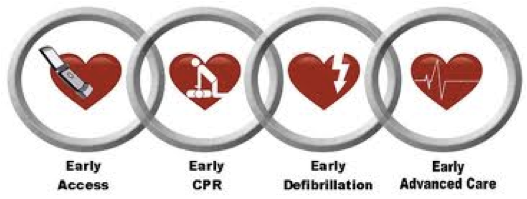This video explains that fire-service based EMS systems are strategically positioned to deliver pre-hospital emergency medical services that incorporate time critical response and effective patient care: (sorry, this video does not have Canadian content)
The Sunnybrook Centre for Prehospital Medicine currently delegates to approximately 1200 paramedics serving Toronto and Peel Region in Ontario, Canada, with the following goals:
- to be international leaders in pre-hospital medicine and Emergency Medical Services Systems to meet the health care needs of the community:
- ensure optimal prehospital patient care and performance of the Emergency Medical Services System
- work synergistically with health and emergency service providers, community organizations, allied services, academic institutions (such as RESCu research team at St. Michael’s Hospital), public and private groups to optimize the delivery of pre-hospital care
- to contribute to the scientific advancement of this unique body of knowledge through excellence and innovation in clinical care, education, and research
Toronto Fire Services (TFS) Emergency Medical Services (EMS) section’s goal is to provide support and direction to Toronto Firefighters in their role as first responders within the Toronto EMS system.
So, what is the connection between the firefighter first responder and pre-hospital patient care?
As Toronto’s EMS system is faced with the challenge of providing care to an increasing and aging population, its capacity to provide such care is often stretched to the limit. Often this translates to extended patient contact time for our crews as paramedics may be delayed while waiting for hospital beds, or traveling longer distances to calls. Therefore, in order to fill our mandate, the EMS section will work with fire personnel, Toronto Emergency Medical Services (TEMS) staff and other city employees to ensure that our crews have the best training and equipment to consistently perform at the highest possible level. The relationship between TFS, TEMS, and Sunnybrook Centre for Prehospital Medicine is unique. The TFS staff, located at the Sunnybrook Campus, participates in a multitude of prehospital care projects and are always available to give a fire perspective on relevant topics.
This arrangement has worked extremely well for all parties and we look forward to a continued close cooperation with both TEMS and Sunnybrook Centre for Prehospital Medicine staff.
We encourage feedback regarding our role within the Toronto Fire Services and invite you to call or email us with your comments or questions
Ken Webb, Manager, Firefighter Prehospital Care Program
Tel. 416-667-2217 or email kwebb@socpc.ca
When a citizen collapses because their heart stops beating, this is called a cardiac arrest.
To maximize the survival chances for those who have a cardiac arrest out-of-hospital, a community must have certain fundamentals and services in place, providing the following chain of survival:

- Early Access
- Someone who witnesses a person having a cardiac arrest must immediately phone 911 or the Emergency Medical Service (EMS) in your area.
- Early CPR
- For the best chance of survival, it is crucial that cardiopulomnary resuscitation (CPR) begin without delay.
- Early Defibrillator
- Delivering an electrical shock by the use of a defibrillator “jump starts” the heart and resets the heart’s electricity
- Early Advanced Care
- This is provided by Advanced Care Paramedics (ACP’s)
Please click here for more info about the above chain of survival.
For two days – April 23 and 24 at the Toronto Fire Academy (auditorium), 895 Eastern Ave., Toronto, 7 p.m – the Sunnybrook Centre for Prehospital Medicine presents Cardiac Save Awards to 650 Toronto firefighters because:
- They played roles in the resuscitation of 197 cardiac patients who survived to hospital discharge
- Between August 2009 and December 2011, Toronto firefighters contributed to the successful resuscitation of 197 patients who were initially vital signs absent
- The firefighters involved have made a significant contribution to Toronto’s pre-hospital care system by providing critical life-saving intervention
- The only hope of surviving a cardiac arrest is with quick cardiopulmonary resuscitation and defibrillation intervention, and thanks to Toronto firefighters, survival has improved
Congratulations!
Toronto, Ontario, Canada
Media Advisory
April 23, 2012
Toronto firefighters honoured with Cardiac Save Awards
The Sunnybrook Centre for Prehospital Medicine will present Cardiac Save Awards to 650 Toronto firefighters who played roles in the resuscitation of almost 200 cardiac patients who survived to hospital discharge.
Date: Monday, April 23, and Tuesday, April 24
Time: 7 p.m.
Location: Toronto Fire Academy (auditorium), 895 Eastern Ave., Toronto
Between August 2009 and December 2011, Toronto firefighters contributed to the successful resuscitation of 197 patients who were initially vital signs absent (VSA).
Many people who experience cardiac arrest suffer complications such as brain damage and never make it home alive even if they were initially resuscitated. The firefighters involved have made a significant contribution to Toronto’s pre-hospital care system by providing critical life-saving intervention.
The only hope of surviving a cardiac arrest is with quick cardiopulmonary resuscitation and defibrillation intervention, and thanks to Toronto firefighters, survival has improved. Toronto Fire Services, in collaboration with the Sunnybrook Centre for Prehospital Medicine and the RESCu research team at St. Michael’s Hospital, continues to participate in medical research.
Toronto is Canada’s largest city and sixth largest government, and home to a diverse population of about 2.7 million people. Toronto’s government is dedicated to delivering customer service excellence, creating a transparent and accountable government, reducing the size and cost of government and building a transportation city. For information on non-emergency City services and programs, Toronto residents, businesses and visitors can dial 311, 24 hours a day, 7 days a week.
——————————————————–
You may also like:
